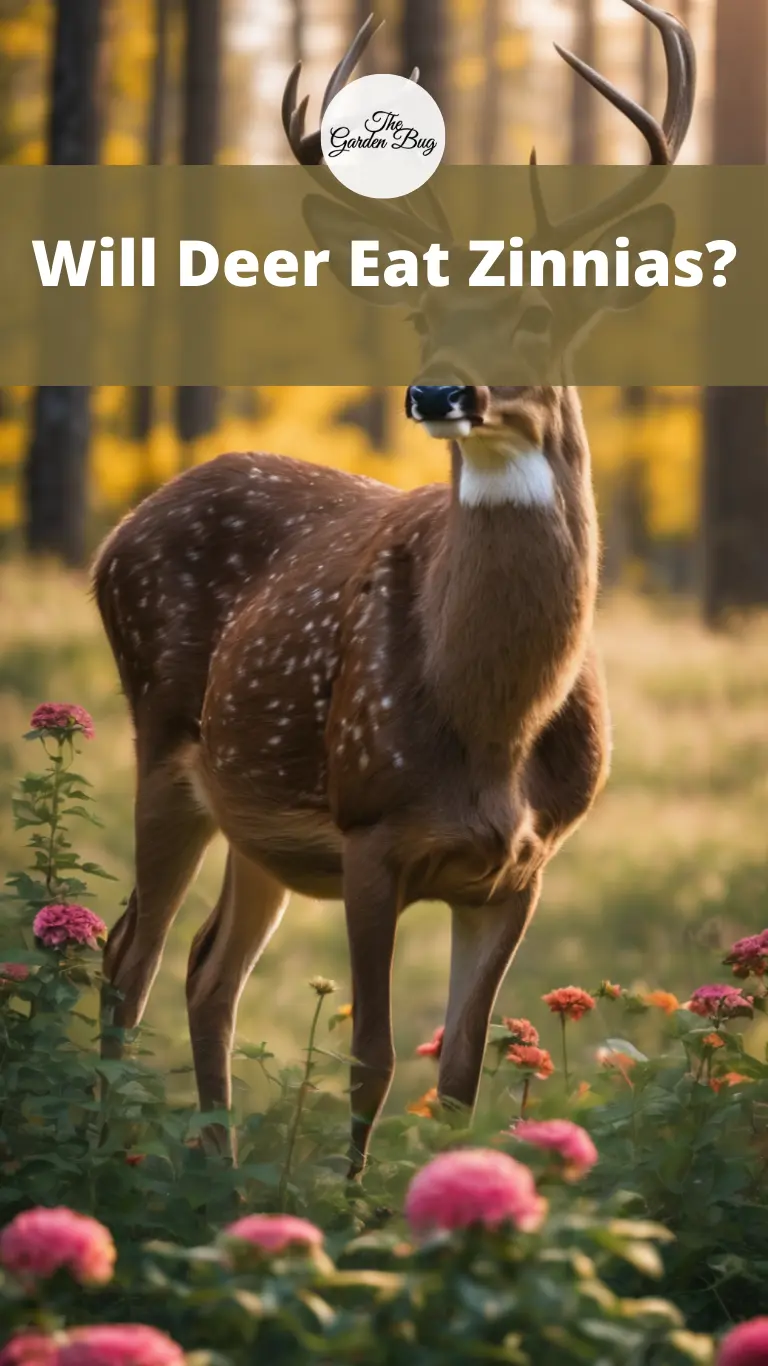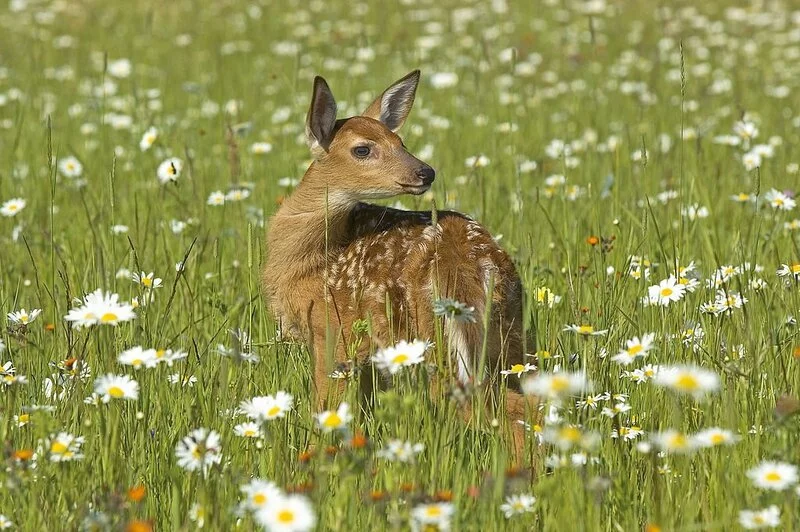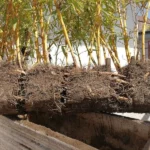Ever noticed your beautiful zinnias having unexpected nibbles? If you live in an area where deer roam freely, it might be them visiting your garden. Zinnias, with their vibrant colors and pleasant aroma, can often catch the attention of these woodland creatures. But the question remains – will deer eat zinnias? We’ll dive into this query and explore what might make your zinnias an irresistible snack for deer.
- Burpee favorite double zinnia has long-stemmed flowers 2.5″ across in a blend of pink, bright Scarlet, yellow, salmon, White and more
- Each packet contains 175 seeds
- Sow outdoors 4 weeks after the average last frost date
- Plant Height is 24″. plant spread is 8″. blooms are 2.5″
- Annual for all growing zones from 1-11. Sunlight exposure = full-sun
Understanding Deer Behavior
Deer are herbivores and their diet mainly consists of green vegetation, nuts, and even some fruits. However, these gentle beings are not just picky eaters, they are opportunistic feeders too. This means that while they have their favorites, when food is scarce, they’ll eat almost anything that’s available.
In a perfect world, deer prefer tender, young shoots and leaves of plants. But their feeding habits are heavily influenced by the availability of food and the season. During winter months or periods of drought when food is hard to find, they are more likely to venture into your garden seeking sustenance. So, while they might not first choose zinnias, these flowers might become quite tempting if deer are in need. In the next section, we’ll take a closer look at deer’s relationship with zinnias specifically.
Deer and Zinnias: A Closer Look
So, what’s the story between deer and zinnias? Do deer find them tasty? Zinnias are not the top choice for deer, but they are not exactly deer-resistant either. This puts them in a gray area when it comes to deer snacking habits.
It’s known that deer tend to avoid plants with a strong fragrance and zinnias, with their mildly pungent scent, can be less appealing to these four-legged visitors. However, in times of scarcity, a hungry deer might overlook the scent and feast on these beautiful blooms. The vibrant colors of zinnias can also be a visual treat that lures them in.
Factors Influencing Deer to Eat Zinnias
A number of factors can influence whether deer will munch on your zinnias or not. These include the availability of other food sources, the number of deer in your area, and how often they wander into your yard.
- Food Availability: If there are other, more appealing food sources available, deer are likely to pass over your zinnias. But, if food is scarce, zinnias can suddenly seem like a fine dining option.
- Deer Population: The more deer in your area, the greater the chance that your zinnias may become a deer snack. More deer mean more mouths to feed, which can lead to less selective eating.
- Accessibility: If your garden is easily accessible and deer frequently pass through it, there’s a higher chance they’ll take a bite of your zinnias. Especially if the plants are close to the deer’s natural path.
Remember, every deer is different and these factors can vary widely. Next, we’ll explore some tips to protect your zinnias from becoming a deer dinner.
Protecting Your Zinnias from Deer
You’ve worked hard to grow your zinnias, and the last thing you want is a deer turning them into dinner. So, what can you do to protect your precious plants?
- Fencing: Fences can be a great way to keep deer out. They should be high enough (at least 8 feet) as deer are great jumpers.
- Repellents: There are many deer repellents available on the market. These can be sprayed around your garden to deter deer. Remember to reapply frequently, especially after rain.
- Noise and Light: Deer are timid creatures. Setting up a motion-activated sprinkler, light, or noise maker can scare them away.
- Plant Placement: Plant your zinnias close to your home or in a location that deer are less likely to approach. Deer typically avoid areas with high human activity.
- Over 100,000 Repeat Customers – For over 20 years Deer Out is the trusted brand for professional gardeners, landscapers and farmers alike. Works Great!
- Minty Fresh Scent – Smells Great to Humans but Deer, Elk and Moose are naturally repelled by our Deer Out patented formula.
- Wont Wash Off – Two Natural Stickers keeps Deer Out on your plants! Deer Out is Rain resistant.
- All Natural ingredients – Deer Out is environmentally friendly using only natural ingredients. Safe for use around children and pets.
- Year-Round Formula – Can be used in all Seasons: Spring, Summer, Winter & Fall
Remember, consistency is key. Keep using these methods and over time, deer will learn that your garden is not the best place for a meal.
Alternative Deer-Resistant Plants
If deer munching on your zinnias becomes a persistent problem, you might consider planting more deer-resistant plants. While no plant is 100% deer-proof, some plants are less likely to be eaten. These include:
- Lavender: With its strong scent, lavender is often overlooked by deer.
- Marigolds: These brightly colored flowers have a pungent smell that deer usually avoid.
- Rosemary: This fragrant herb is another good choice to deter deer.
- Russian Sage: This plant has fuzzy, silvery leaves and beautiful blue flowers that deer tend not to like.
- Attracts pollinators and great for drying & crafts
- Garden use: herb gardens, containers, vegetable & flower beds
- Culinary use: baking, teas, sugars, jellies, paired with berries or citrus
- Plant in full sun for the best yields
- Plant after last spring frost
Choosing more deer-resistant plants can be a great way to keep your garden beautiful while also ensuring it doesn’t become a buffet for your local deer population.
Frequently Asked Questions
- Are there any other ways to deter deer from my garden? Yes, having a dog in your yard can scare away deer. Also, some gardeners have found success by using human hair or soap as a deterrent.
- I have a fence but deer are still getting into my garden. What can I do? Deer are excellent jumpers. Consider raising your fence height or adding a second layer of fencing. Angled fences can also deter deer from jumping over.
- Do deer eat all types of flowers? Deer may sample many types of plants in your garden, but they have preferences. They typically avoid plants with strong scents, tough leaves, or plants that are poisonous to them.
Conclusion
In the end, it’s all about balance. Deer are a part of nature and while we might not want them nibbling on our precious zinnias, it’s important to remember that they have a place in the ecosystem. With the right strategies and a bit of patience, you can enjoy your beautiful zinnias and live in harmony with the deer. Remember, gardening is not just about growing plants, but also about growing with nature.






